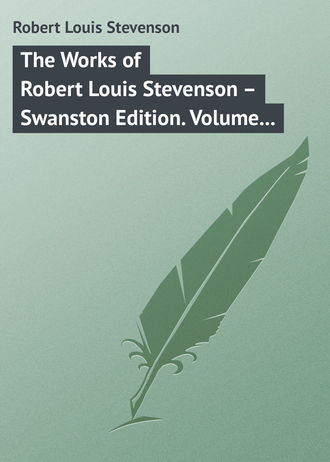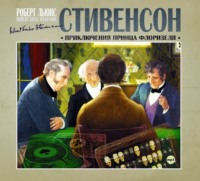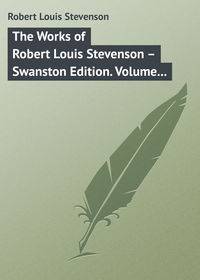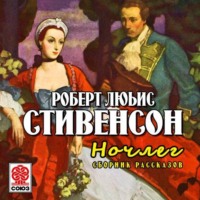 полная версия
полная версияThe Works of Robert Louis Stevenson – Swanston Edition. Volume 16
Friday,
19th Oct.
The light-room work had proceeded, as usual, to-day under the direction of Mr. Dove, assisted in the plumber-work by Mr. John Gibson, and in the brazier-work by Mr. Joseph Fraser; while Mr. James Slight, with the joiners, were fitting up the storm-shutters of the windows. In these several departments the artificers were at work till seven o’clock p.m., and it being then dark, Mr. Dove gave orders to drop work in the light-room; and all hands proceeded from thence to the beacon-house, when Charles Henderson, smith, and Henry Dickson, brazier, left the work together. Being both young men, who had been for several weeks upon the rock, they had become familiar, and even playful, on the most difficult parts about the beacon and building. This evening they were trying to outrun each other in descending from the light-room, when Henderson led the way; but they were in conversation with each other till they came to the rope-ladder distended between the entrance-door of the lighthouse and the beacon. Dickson, on reaching the cook-room, was surprised at not seeing his companion, and inquired hastily for Henderson. Upon which the cook replied, “Was he before you upon the rope-ladder?” Dickson answered, “Yes; and I thought I heard something fall.” Upon this the alarm was given, and links were immediately lighted, with which the artificers descended on the legs of the beacon, as near the surface of the water as possible, it being then about full tide, and the sea breaking to a considerable height upon the building, with the wind at S.S.E. But, after watching till low-water, and searching in every direction upon the rock, it appeared that poor Henderson must have unfortunately fallen through the rope-ladder and been washed into the deep water.
The deceased had passed along this rope-ladder many hundred times, both by day and night, and the operations in which he was employed being nearly finished, he was about to leave the rock when this melancholy catastrophe took place. The unfortunate loss of Henderson cast a deep gloom upon the minds of all who were at the rock, and it required some management on the part of those who had charge to induce the people to remain patiently at their work; as the weather now became more boisterous, and the nights long, they found their habitation extremely cheerless, while the winds were howling about their ears, and the waves lashing with fury against the beams of their insulated habitation.
Tuesday,
23rd Oct.
The wind had shifted in the night to N.W., and blew a fresh gale, while the sea broke with violence upon the rock. It was found impossible to land, but the writer, from the boat, hailed Mr. Dove, and directed the ball to be immediately fixed. The necessary preparations were accordingly made, while the vessel made short tacks on the southern side of the rock, in comparatively smooth water. At noon Mr. Dove, assisted by Mr. James Slight, Mr. Robert Selkirk, Mr. James Glen, and Mr. John Gibson, plumber, with considerable difficulty, from the boisterous state of the weather, got the gilded ball screwed on, measuring two feet in diameter, and forming the principal ventilator at the upper extremity of the cupola of the lightroom. At Mr. Hamilton’s desire, a salute of seven guns was fired on this occasion, and, all hands being called to the quarter-deck, “Stability to the Bell Rock Lighthouse” was not forgotten.
Tuesday,
30th Oct.
On reaching the rock it was found that a very heavy sea still ran upon it; but the writer having been disappointed on two former occasions, and, as the erection of the house might now be considered complete, there being nothing wanted externally, excepting some of the storm-shutters for the defence of the windows, he was the more anxious at this time to inspect it. Two well-manned boats were therefore ordered to be in attendance; and, after some difficulty, the wind being at N.N.E., they got safely into the western creek, though not without encountering plentiful sprays. It would have been impossible to have attempted a landing to-day, under any other circumstances than with boats perfectly adapted to the purpose, and with seamen who knew every ledge of the rock, and even the length of the sea-weeds at each particular spot, so as to dip their oars into the water accordingly, and thereby prevent them from getting entangled. But what was of no less consequence to the safety of the party, Captain Wilson, who always steered the boat, had a perfect knowledge of the set of the different waves, while the crew never shifted their eyes from observing his motions, and the strictest silence was preserved by every individual except himself.
On entering the house, the writer had the pleasure to find it in a somewhat habitable condition, the lower apartments being closed in with temporary windows, and fitted with proper storm-shutters. The lowest apartment at the head of the staircase was occupied with water, fuel, and provisions, put up in a temporary way until the house could be furnished with proper utensils. The second, or light-room store, was at present much encumbered with various tools and apparatus for the use of the workmen. The kitchen immediately over this had, as yet, been supplied only with a common ship’s caboose and plate-iron funnel, while the necessary cooking utensils had been taken from the beacon. The bedroom was for the present used as the joiners’ workshop, and the strangers’ room, immediately under the light-room, was occupied by the artificers, the beds being ranged in tiers, as was done in the barrack of the beacon. The lightroom, though unprovided with its machinery, being now covered over with the cupola, glazed and painted, had a very complete and cleanly appearance. The balcony was only as yet fitted with a temporary rail, consisting of a few iron stanchions, connected with ropes; and in this state it was necessary to leave it during the winter.
Having gone over the whole of the low-water works on the rock, the beacon, and lighthouse, and being satisfied that only the most untoward accident in the landing of the machinery could prevent the exhibition of the light in the course of the winter, Mr. John Reid, formerly of the floating light, was now put in charge of the lighthouse as principal keeper; Mr. James Slight had charge of the operations of the artificers, while Mr. James Dove and the smiths, having finished the frame of the light-room, left the rock for the present. With these arrangements the writer bade adieu to the works for the season. At eleven a.m. the tide was far advanced; and there being now little or no shelter for the boats at the rock, they had to be pulled through the breach of sea, which came on board in great quantities, and it was with extreme difficulty that they could be kept in the proper direction of the landing-creek. On this occasion he may be permitted to look back with gratitude on the many escapes made in the course of this arduous undertaking, now brought so near to a successful conclusion.
Monday,
5th Nov.
On Monday, the 5th, the yacht again visited the rock, when Mr. Slight and the artificers returned with her to the workyard, where a number of things were still to prepare connected with the temporary fitting up of the accommodation for the lightkeepers. Mr. John Reid and Peter Fortune were now the only inmates of the house. This was the smallest number of persons hitherto left in the lighthouse. As four lightkeepers were to be the complement, it was intended that three should always be at the rock. Its present inmates, however, could hardly have been better selected for such a situation; Mr. Reid being a person possessed of the strictest notions of duty and habits of regularity from long service on board of a man-of-war, while Mr. Fortune had one of the most happy and contented dispositions imaginable.
Tuesday,
13th Nov.
From Saturday the 10th till Tuesday the 13th, the wind had been from N.E. blowing a heavy gale; but to-day, the weather having greatly moderated, Captain Taylor, who now commanded the Smeaton, sailed at two o’clock a.m. for the Bell Rock. At five the floating light was hailed and found to be all well. Being a fine moonlight morning, the seamen were changed from the one ship to the other. At eight, the Smeaton being off the rock, the boats were manned, and taking a supply of water, fuel, and other necessaries, landed at the western side, when Mr. Reid and Mr. Fortune were found in good health and spirits.
Mr. Reid stated that during the late gales, particularly on Friday, the 30th, the wind veering from S.E. to N.E., both he and Mr. Fortune sensibly felt the house tremble when particular seas struck, about the time of high-water; the former observing that it was a tremor of that sort which rather tended to convince him that everything about the building was sound, and reminded him of the effect produced when a good log of timber is struck sharply with a mallet; but, with every confidence in the stability of the building, he nevertheless confessed that, in so forlorn a situation, they were not insensible to those emotions which, he emphatically observed, “made a man look back upon his former life.”
Friday,
1st Feb.
The day, long wished for, on which the mariner was to see a light exhibited on the Bell Rock at length arrived. Captain Wilson, as usual, hoisted the float’s lanterns to the topmast on the evening of the 1st of February; but the moment that the light appeared on the rock, the crew, giving three cheers, lowered them, and finally extinguished the lights.
ADDITIONAL MEMORIES AND PORTRAITS
I
RANDOM MEMORIES
I. THE COAST OF FIFE
Many writers have vigorously described the pains of the first day or the first night at school; to a boy of any enterprise, I believe, they are more often agreeably exciting. Misery – or at least misery unrelieved – is confined to another period, to the days of suspense and the “dreadful looking-for” of departure; when the old life is running to an end, and the new life, with its new interests, not yet begun; and to the pain of an imminent parting, there is added the unrest of a state of conscious pre-existence. The area railings, the beloved shop-window, the smell of semi-suburban tanpits, the song of the church-bells upon a Sunday, the thin, high voices of compatriot children in a playing-field – what a sudden, what an overpowering pathos breathes to him from each familiar circumstance! The assaults of sorrow come not from within, as it seems to him, but from without. I was proud and glad to go to school; had I been let alone, I could have borne up like any hero; but there was around me, in all my native town, a conspiracy of lamentation: “Poor little boy, he is going away – unkind little boy, he is going to leave us”; so the unspoken burthen followed me as I went, with yearning and reproach. And at length, one melancholy afternoon in the early autumn, and at a place where it seems to me, looking back, it must be always autumn and generally Sunday, there came suddenly upon the face of all I saw – the long empty road, the lines of the tall houses, the church upon the hill, the woody hillside garden – a look of such a piercing sadness that my heart died; and seating myself on a door-step, I shed tears of miserable sympathy. A benevolent cat cumbered me the while with consolations – we two were alone in all that was visible of the London Road: two poor waifs who had each tasted sorrow – and she fawned upon the weeper, and gambolled for his entertainment, watching the effect, it seemed, with motherly eyes.
For the sake of the cat, God bless her! I confessed at home the story of my weakness; and so it comes about that I owed a certain journey, and the reader owes the present paper, to a cat in the London Road. It was judged, if I had thus brimmed over on the public highway, some change of scene was (in the medical sense) indicated; my father at the time was visiting the harbour lights of Scotland; and it was decided that he should take me along with him around a portion of the shores of Fife; my first professional tour, my first journey in the complete character of man, without the help of petticoats.
The Kingdom of Fife (that royal province) may be observed by the curious on the map, occupying a tongue of land between the firths of Forth and Tay. It may be continually seen from many parts of Edinburgh (among the rest, from the windows of my father’s house) dying away into the distance and the easterly haar with one smoky seaside town beyond another, or in winter printing on the grey heaven some glittering hill-tops. It has no beauty to recommend it, being a low, sea-salted, wind-vexed promontory; trees very rare, except (as common on the east coast) along the dens of rivers; the fields well cultivated, I understand, but not lovely to the eye. It is of the coast I speak: the interior may be the garden of Eden. History broods over that part of the world like the easterly haar. Even on the map, its long row of Gaelic place-names bear testimony to an old and settled race. Of these little towns, posted along the shore as close as sedges, each with its bit of harbour, its old weather-beaten church or public building, its flavour of decayed prosperity and decaying fish, not one but has its legend, quaint or tragic: Dunfermline, in whose royal towers the king may be still observed (in the ballad) drinking the blood-red wine; somnolent Inverkeithing, once the quarantine of Leith; Aberdour, hard by the monastic islet of Inchcolm, hard by Donibristle where the “bonny face was spoiled”: Burntisland, where, when Paul Jones was off the coast, the Reverend Mr. Shirra had a table carried between tide-marks, and publicly prayed against the rover at the pitch of his voice and his broad lowland dialect; Kinghorn, where Alexander “brak’s neck-bane” and left Scotland to the English wars; Kirkcaldy, where the witches once prevailed extremely and sank tall ships and honest mariners in the North Sea; Dysart, famous – well, famous at least to me for the Dutch ships that lay in its harbour, painted like toys and with pots of flowers and cages of song-birds in the cabin-windows, and for one particular Dutch skipper who would sit all day in slippers on the break of the poop, smoking a long German pipe; Wemyss (pronounced Weems) with its bat-haunted caves, where the Chevalier Johnstone, on his flight from Culloden, passed a night of superstitious terrors; Leven, a bald, quite modern place, sacred to summer visitors, whence there has gone but yesterday the tall figure and the white locks of the last Englishman in Delhi, my uncle Dr. Balfour, who was still walking his hospital rounds, while the troopers from Meerut clattered and cried “Deen Deen” along the streets of the imperial city, and Willoughby mustered his handful of heroes at the magazine, and the nameless brave one in the telegraph office was perhaps already fingering his last despatch; and just a little beyond Leven, Largo Law and the smoke of Largo town mounting about its feet, the town of Alexander Selkirk, better known under the name of Robinson Crusoe. So on the list might be pursued (only for private reasons, which the reader will shortly have an opportunity to guess) by St. Monans, and Pittenweem, and the two Anstruthers, and Cellardyke, and Crail, where Primate Sharpe was once a humble and innocent country minister: on to the heel of the land, to Fife Ness, overlooked by a sea-wood of matted elders and the quaint old mansion of Balcomie, itself overlooking but the breach or the quiescence of the deep – the Carr Rock beacon rising close in front, and as night draws in, the star of the Inchcape reef springing up on the one hand, and the star of the May Island on the other, and farther off yet a third and a greater on the craggy foreland of St. Abb’s. And but a little way round the corner of the land, imminent itself above the sea, stands the gem of the province and the light of mediæval Scotland, St. Andrews, where the great Cardinal Beaton held garrison against the world, and the second of the name and title perished (as you may read in Knox’s jeering narrative) under the knives of true-blue Protestants, and to this day (after so many centuries) the current voice of the professor is not hushed.
Here it was that my first tour of inspection began, early on a bleak easterly morning. There was a crashing run of sea upon the shore, I recollect, and my father and the man of the harbour light must sometimes raise their voices to be audible. Perhaps it is from this circumstance, that I always imagine St. Andrews to be an ineffectual seat of learning, and the sound of the east wind and the bursting surf to linger in its drowsy class-rooms and confound the utterance of the professor, until teacher and taught are alike drowned in oblivion, and only the sea-gull beats on the windows and the draught of the sea-air rustles in the pages of the open lecture. But upon all this, and the romance of St. Andrews in general, the reader must consult the works of Mr. Andrew Lang; who has written of it but the other day in his dainty prose and with his incommunicable humour, and long ago, in one of his best poems, with grace and local truth and a note of unaffected pathos. Mr. Lang knows all about the romance, I say, and the educational advantages, but I doubt if he had turned his attention to the harbour lights; and it may be news even to him, that in the year 1863 their case was pitiable. Hanging about with the east wind humming in my teeth, and my hands (I make no doubt) in my pockets, I looked for the first time upon that tragi-comedy of the visiting engineer which I have seen so often re-enacted on a more important stage. Eighty years ago, I find my grandfather writing: “It is the most painful thing that can occur to me to have a correspondence of this kind with any of the keepers, and when I come to the Light House, instead of having the satisfaction to meet them with approbation and welcome their Family, it is distressing when one is obliged to put on a most angry countenance and demeanour.” This painful obligation has been hereditary in my race. I have myself, on a perfectly amateur and unauthorised inspection of Turnberry Point, bent my brows upon the keeper on the question of storm-panes; and felt a keen pang of self-reproach, when we went downstairs again and I found he was making a coffin for his infant child; and then regained my equanimity with the thought that I had done the man a service, and when the proper inspector came, he would be readier with his panes. The human race is perhaps credited with more duplicity than it deserves. The visitation of a lighthouse at least is a business of the most transparent nature. As soon as the boat grates on the shore, and the keepers step forward in their uniformed coats, the very slouch of the fellows’ shoulders tells their story, and the engineer may begin at once to assume his “angry countenance.” Certainly the brass of the handrail will be clouded; and if the brass be not immaculate, certainly all will be to match – the reflectors scratched, the spare lamp unready, the storm-panes in the storehouse. If a light is not rather more than middling good, it will be radically bad. Mediocrity (except in literature) appears to be unattainable by man. But of course the unfortunate of St. Andrews was only an amateur, he was not in the Service, he had no uniform coat, he was, I believe, a plumber by his trade, and stood (in the mediæval phrase) quite out of the danger of my father; but he had a painful interview for all that, and perspired extremely.
From St. Andrews we drove over Magus Muir. My father had announced we were “to post,” and the phrase called up in my hopeful mind visions of top-boots and the pictures in Rowlandson’s “Dance of Death”; but it was only a jingling cab that came to the inn door, such as I had driven in a thousand times at the low price of one shilling on the streets of Edinburgh. Beyond this disappointment, I remember nothing of that drive. It is a road I have often travelled, and of not one of these journeys do I remember any single trait. The fact has not been suffered to encroach on the truth of the imagination. I still see Magus Muir two hundred years ago: a desert place, quite unenclosed; in the midst, the primate’s carriage fleeing at the gallop; the assassins loose-reined in pursuit, Burley Balfour, pistol in hand, among the first. No scene of history has ever written itself so deeply on my mind; not because Balfour, that questionable zealot, was an ancestral cousin of my own; not because of the pleadings of the victim and his daughter; not even because of the live bum-bee that flew out of Sharpe’s ’bacco-box, thus clearly indicating his complicity with Satan; nor merely because, as it was after all a crime of a fine religious flavour, it figured in Sunday books and afforded a grateful relief from “Ministering Children” or the “Memoirs of Mrs. Katherine Winslowe.” The figure that always fixed my attention is that of Hackston of Rathillet, sitting in the saddle with his cloak about his mouth, and through all that long, bungling, vociferous hurly-burly, revolving privately a case of conscience. He would take no hand in the deed, because he had a private spite against the victim, and “that action” must be sullied with no suggestion of a worldly motive; on the other hand, “that action” in itself was highly justified, he had cast in his lot with “the actors,” and he must stay there, inactive, but publicly sharing the responsibility. “You are a gentleman – you will protect me!” cried the wounded old man, crawling towards him. “I will never lay a hand on you,” said Hackston, and put his cloak about his mouth. It is an old temptation with me to pluck away that cloak and see the face – to open that bosom and to read the heart. With incomplete romances about Hackston, the drawers of my youth were lumbered. I read him up in every printed book that I could lay my hands on. I even dug among the Wodrow manuscripts, sitting shame-faced in the very room where my hero had been tortured two centuries before, and keenly conscious of my youth in the midst of other and (as I fondly thought) more gifted students. All was vain: that he had passed a riotous nonage, that he was a zealot, that he twice displayed (compared with his grotesque companions) some tincture of soldierly resolution and even of military common sense, and that he figured memorably in the scene on Magus Muir, so much and no more could I make out. But whenever I cast my eyes backward, it is to see him like a landmark on the plains of history, sitting with his cloak about his mouth, inscrutable. How small a thing creates an immortality! I do not think he can have been a man entirely commonplace; but had he not thrown his cloak about his mouth, or had the witnesses forgot to chronicle the action, he would not thus have haunted the imagination of my boyhood, and to-day he would scarce delay me for a paragraph. An incident, at once romantic and dramatic, which at once awakes the judgment and makes a picture for the eye, how little do we realise its perdurable power! Perhaps no one does so but the author, just as none but he appreciates the influence of jingling words; so that he looks on upon life, with something of a covert smile, seeing people led by what they fancy to be thoughts and what are really the accustomed artifices of his own trade, or roused by what they take to be principles and are really picturesque effects. In a pleasant book about a school-class club, Colonel Fergusson has recently told a little anecdote. A “Philosophical Society” was formed by some Academy boys – among them, Colonel Fergusson himself, Fleeming Jenkin, and Andrew Wilson, the Christian Buddhist and author of “The Abode of Snow.” Before these learned pundits, one member laid the following ingenious problem: “What would be the result of putting a pound of potassium in a pot of porter?” “I should think there would be a number of interesting bi-products,” said a smatterer at my elbow; but for me the tale itself has a bi-product, and stands as a type of much that is most human. For this inquirer, who conceived himself to burn with a zeal entirely chemical, was really immersed in a design of a quite different nature: unconsciously to his own recently breeched intelligence, he was engaged in literature. Putting, pound, potassium, pot, porter; initial p, mediant t – that was his idea, poor little boy! So with politics and that which excites men in the present, so with history and that which rouses them in the past: there lie, at the root of what appears, most serious unsuspected elements.









